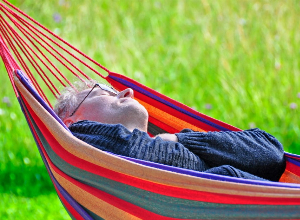The restorative power of a nap and its health benefits!
Published Aug 10, 2023 • By Claudia Lima
Napping is a fairly widespread and natural practice for humans, as it is for many mammals.
Today, it is the subject of growing interest in the field of health and well-being. Research has shown that taking a nap is a real treasure trove for our physical and mental health. In fact, its benefits are numerous.
What is a nap? What are its benefits?
Find all the answers in our article!

Taking a nap: what is it about?
A nap is defined as a time of rest during the day, especially after lunch.
Napping can be beneficial at any age, especially when you don't get enough sleep at night and feel tired during the day. What's more, human beings are naturally programmed to rest at midday, around 1pm, and no later than 4pm. The reduced alertness we may feel after lunch has nothing to do with digestion.
Nevertheless, in the event of excessive sleepiness during the day, which could lead to daily naps, it is advisable to see a sleep specialist.
What are the health benefits of napping?
A nap is more than just a moment's rest: it's a powerful tool for improving our physical and mental health, our productivity and our overall well-being.
Here are just a few of its benefits:
Improving physical shape
Taking a nap helps the muscles to recover and eliminates toxic metabolites, compounds produced and transformed by the body's metabolism. This reduces physical fatigue and increases vitality, leaving the body in a better shape.
Reducing stress and anxiety
By taking a moment to relax during the day, the body releases relaxing hormones. This promotes a feeling of calm and well-being, which helps you to better cope with everyday challenges.
Napping reduces stress, and also the level of cortisol, thus improving your heart health, as the risk of cardiovascular disease decreases.
Strengthening the immune system
Sleep in general, including naps, plays a crucial role in strengthening the immune system. The body is better prepared to fight infections.
Improving cognitive performance
Napping can improve cognitive performance, concentration, creativity and memory. The brain gets the opportunity to consolidate the information it has learnt, which improve the retention of knowledge and new skills. It also makes it easier to learn and memorize. It generates greater alertness and concentration.
Stimulating creativity
Napping encourages our brain to create new ideas and innovative solutions to problems.
How to take a good nap?
There are different types of nap, and for them to be really effective in terms of recovery, you need to do it properly.
It's also important to choose the right duration:
- The flash nap. It lasts 2 to 3 minutes and can be revitalizing,
- The micro-nap. It lasts for 10 minutes, no more. It prevents you from falling into a deep sleep. It stimulates alertness. It is effective before an important meeting,
- The classic nap. It lasts between 20 and 30 minutes maximum. It is a mixture of light and deep sleep. It restores intellectual and physical capacity and boosts immunity,
- The long nap. It lasts between 60 and 90 minutes. It's ideal for recovering from a disturbed night's sleep, settling a large sleep debt or before driving long distance.
Naps lasting more than 30 minutes are not recommended for people suffering from chronic insomnia, as they risk altering the quality of sleep at night.
To know when to take a nap, you need to listen to your needs and find the most appropriate time, between 1 p.m. and 4 p.m. To do this, you need to identify the signs of sleepiness, such as feeling tired, heavy eyelids, yawning or the desire to have a coffee, for example.
For a successful nap, it is recommended to:
- Seclude yourself in a quiet, dark place, away from screens,
- Lie down on a couch or a reclining armchair,
- Find a comfortable position,
- Relax, breathe deeply and concentrate on your senses. Self-hypnosis and sophrology techniques help you to relax.
To enjoy the benefits of a nap, it is essential to wake up calmly, but also to feel fit after this moment of rest. It is important to take it easy when you wake up, not to jump to your feet, but to get up as you would when waking up in the morning. In other words, stretch, get your muscles moving, and then sit up.
Are there any precautions to take or any contraindications to napping?
A nap should not be too long, as it may disrupt the process of falling asleep and sleeping through the night, leading to potential insomnia. You should remember to set an alarm clock.
After a certain duration, napping tends to be linked to a greater risk of developing certain illnesses. Some studies have shown that after more than half an hour of napping, the risk of heart rhythm disorders increases. Other studies show that long naps of over an hour are associated with metabolic diseases such as obesity, high blood pressure and certain heart conditions.
Also, napping does not really compensate for a lack of sleep at night. The same applies to late mornings at the weekend.
Napping for too long can cause fatigue, delaying bedtime and upsetting the circadian rhythm. That's why napping should be done in moderation.
Napping is beneficial to both physical and mental health. By giving the brain and body a break, productivity is improved, as is creativity and general well-being, but certain recommendations must be followed to ensure that its benefits remain intact.
Give it a "Like" and share your thoughts and questions with the community in the comments below!
Take care!
1 comment
You will also like

What are the dangers associated with the over-the-counter sale of certain medicines?
Dec 19, 2020 • 6 comments

 Facebook
Facebook Twitter
Twitter


